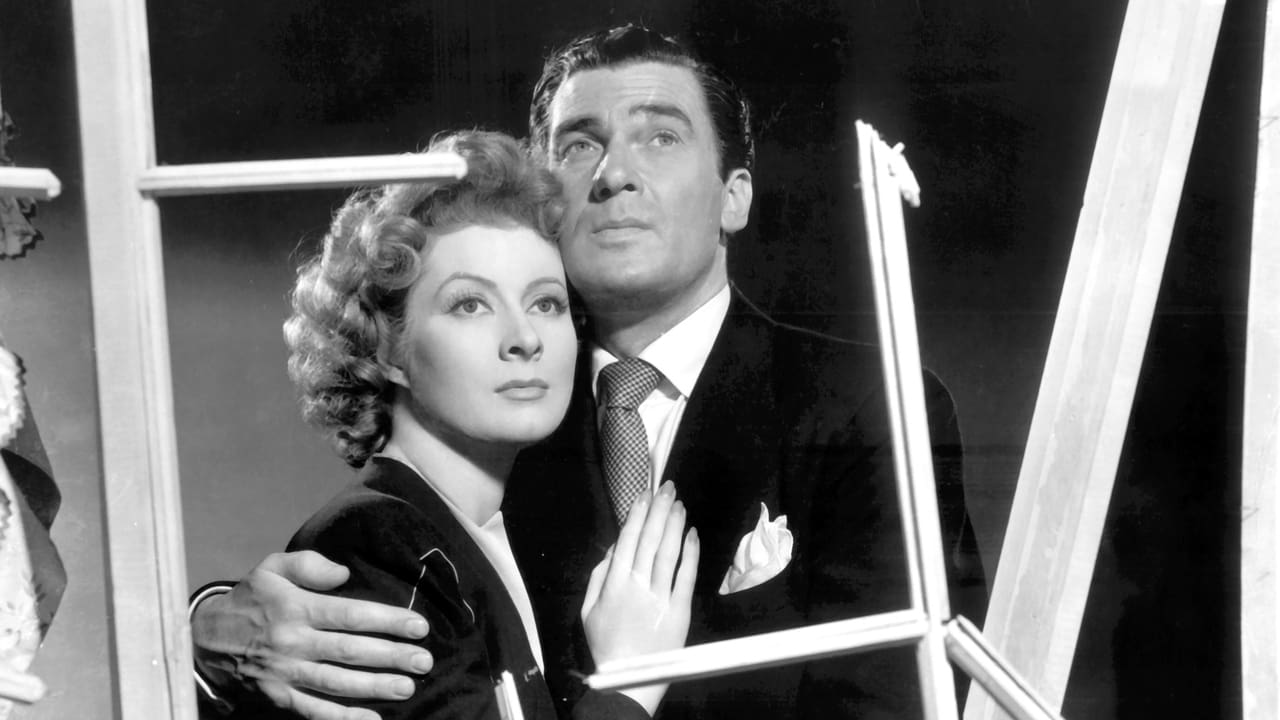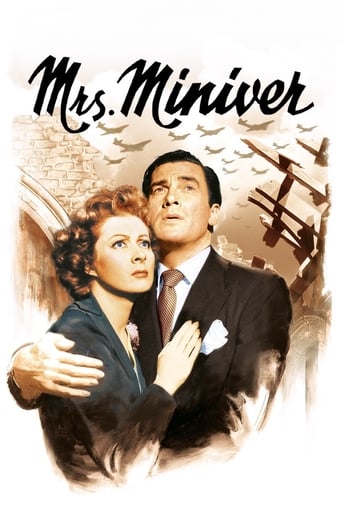

It's hard to believe that out of the Academy Award's eighty five year existence, there have only been a handful of Best Picture winners I would consider truly grand and worth anyone's time. True few have been of decidedly crappy quality, but fewer still I would peg as a must see that will change your life for the better. Mrs. Miniver (1942) is decidedly not a movie of exceptional caliber.Mrs. Miniver is an American film about a middle class British family who is faced with the grim realities of WWII. Greer Garson plays the title role with the esteemed Walter Pidgeon fudds-his-duddy as the family patriarch. They are fairly happy in marriage and have managed to crank out three kids, the oldest just returning from Oxford. As the film progresses the family has to face German spying, German bombing and British nobility faking nobility.Released in the midst of WWII, William Wyler's family war drama has the telling sense of weariness of a movie trying to rally people for war. Did I mention there's a war going on? It's a propaganda film through and through, with the family a microcosm of British unity and stiff upper lip attitude. At least Henry V (1944) had the good graces to take place in another war to rally English troops for modern warfare. Similarly Michael Powell and Emeric Pressburger's 49th Parallel (1941) largely took the perspective of a squadron of Nazis to insert its Union Jack pride. Now I'm not saying patriotism is a bad thing, especially when it's sorely needed in a time of life-or-death struggle. But despite British actors, the film I feel rings hollow for contemporary audiences.Of course Mrs. Miniver was a Best Picture winner for a reason, and that reason isn't limited to pride. The film is occasionally nice to look at. William Wyler's direction is confident and top-notch as always and being an American production shot in California, the dialogue is earnest and free of an abundance of Britishisms like a romance shrouded in social protocol or villains explaining their plans for the sake of gentlemanly fair play. The scenes taking place among ruined countryside and masonry is arguably some of the best set designs of the period. Furthermore Garson's Miniver is a solid foundation for the other performances to ground themselves.Mrs. Miniver ultimately reminds me of The King's Speech (2010) in its grandeur. The King's Speech is a great movie but did it really deserve to beat out The Social Network (2010) or Toy Story 3 (2010) for the coveted golden statuette? Well there's an argument to be made but Mrs. Miniver went up against 49th Parallel (1942), Pride of the Yankees (1942) and Yankee Doodle Dandy (1942). Watch them all then tell me which you remember more.http://www.theyservepopcorninhell.blogspot.com
... View MoreThere's nothing like a suburban British housewife to aid her family in getting through the war. In the case of the upper middle class Miniver family, it is the wife (Greer Garson) who keeps the home fires burning, literally, as she fends off Nazi fliers, keeps her children calm in an air raid, and helps the family mend through a tragedy concerning her oldest son (Richard Ney) and the young woman he loves (Teresa Wright). She is also beloved in her village of Belden, given the distinct honor of having a beautiful red rose named after her by the town's long-time railroad station master (Henry Travers), daring to enter it in a contest opposite the town's delightfully imperious matriarch (Dame May Witty), Wright's grandmother. This leads to the famous town flower show sequence, a plot element so remembered by fans that years later it was incorporated into "Downton Abbey" involving Dame Maggie Smith's character.Of course, there's more to this film than a flower show, the guilt over buying a new hat during troubled financial times (while husband Walter Pidgeon buys a new car on the very same day with the same trepidation of telling his wife) and young love. It's about England's transition from innocence to potential annihilation as the evil Nazi Germany bombs the town (at least they waited until the winner of the Belden cup was announced), and how peace loving communities will not allow tyrants to attempt to destroy their freedom. Everybody in this peaceful village gets involved, from store owner turned air raid warden Reginald Owen, parson Henry Wilcoxin and even the Miniver's servants. A screenplay filled with light sentiment, sweet romance, subtle comedy and a divine spirituality of good vs. evil makes this truly a perfect film with everybody excellently cast and the pacing perfectly fitting to each mood that the film undertakes.It's been tempting over the years to make fun of this film which has been spoofed ("Laugh-In", parodying the Nazi soldier with Arte Johnson approaching guest-star Garson) and given legend for Garson's alleged lengthy Oscar speech. It should be noted that 1943's Oscar Winning Best Film "Casablanca" had a New York release during the same year as "Mrs. Miniver", which makes a close call for which of the two would have won the Oscar had "Casablanca" had its Los Angeles release just a few months earlier. On its own, "Mrs. Miniver" still stands the test of time today, and that is also due to its brilliant screenplay and tight direction by the legendary William Wyler.
... View MoreNicely done story of an English family during the blitz in 1940-41. Before the war, we are introduced to Mrs. Miniver (Garson), matriarch of a warm, happy middle-class family straight out of "Father Knows Best" except that in this case it's usually Mother who knows best. She and her architect husband (Pigeon) have three children, two small and cute, one grown up and just out of Oxford. He's smart but he's a callow youth. (All youths are callow.) The kid sounds like a fatuous Marxist at the dinner table, but a pretty guest (Wright) soon brings him down to earth.Theresa Wright is a member of the Beldon family. They're aristocrats, not middle-class like the Minivers. There is also a working class in the village, shopkeepers, postmen, and people of that ilk, and the Minivers enjoy friendly relations with all of them. But Lady Beldon (Whitty), the Aristocrat-in-Chief, holds them all in contempt. However, the aristocratic Wright and the non-U Miniver son from Oxford fall in love and -- Well, I could go on with this, but not without sounding like a sociologist.What it is, is a kind of training film for civilians during war time. Mrs. Miniver is a resolute, brave, uncomplaining, church-going, stiff-upper-lip model of civilian endurance. Not just for the Brits who, by the time of this release, had already learned any lessons to be derived from suffering, but for Americans too. The movie was released in 1942 and shot in 1941, when Europe had been at war for years and everyone knew that the war was just around the corner for Americans. So, while the Army recruits were getting movies showing them how to avoid venereal disease, the civilian audiences got movies like this, demonstrating how to avoid breaking down under stress.It's filled with stereotypes but well done for what it is. I'll give an example of a well-written scene. It's the blitz. The Miniver family is huddled down in its bomb shelter in the back yard of the mansion they live in. They're subject to Nazi bombs that scare hell out of them and bash in their dining room.Here's how a perfunctory script would handle the scene. The sirens wail. The family rushes to the shelter. Suddenly -- overhead -- the roar of airplane engines. Anti-aircraft batteries bark at the enemy. A salvo of bombs blasts the shelter as the brave but terrified Minivers huddle together and silently pray. The bombs stop as abruptly as they began. The Minivers emerge from the shelter and stare, stricken, at their smoking, half-ruined manse.Not here. The scene opens with the family already in the shelter, looking out the door while a city on the horizon is aglow with searchlights probing the sky and fitful bursts of anti-aircraft shells. "Not many bombs," observes Pigeon. And we think, "Whew, at least the Minivers aren't getting slammed." Back into the shelter, where they read "Alice in Wonderland" to their dozing children. Then, from nearby, the loud KRUPP of batteries going into action. Then the sound of airplanes. The Minivers sit silently, Garson knitting calmly, Pigeon staring at the walls. Nobody says anything about having loose bowels or needing a jolt of whiskey. The whistle of the first bomb at a distance. Then another, closer. Then a veritable rain of bombs knocking everything over in the shelter. Fade out.A scene at the railway station follows. The Oxfordian is in the RAF and has just returned from his honeymoon with Wright. After an effusive greeting, Pigeon says, "Well -- I'll show you to your room." And they walk up the path into the house, and for the first time we see that half the house seems to have been dismantled by the bombs -- windows broken, daylight showing through the roof, furniture reduced to kindling.I've spent that much time on one scene because the scene illustrates the care with which the script was put together. A more reckless approach would have had the whole business over with in five minutes. Instead, the terror and ultimate shock are allowed to creep up on us, bit by bit, as the threat grows nearer and the aftermath of its impact delayed. Good job.Helmut Dantine is a surprise as a downed and desperate German pilot. For one thing, he's handsome instead of ugly. For another, he shows weakness from his wound and when he collapses in pain, we almost feel sympathy. I only wish he hadn't had to eat like an animal and bark out order like, "Give -- me -- coat." He should be stalwart. Instead, he acts and sounds like Frankenstein's monster.
... View MoreI'm sorry, but I've always felt that this film is overrated. The story is good, as a propaganda piece, yet the acting and the production values leave much to be desired.To begin with, this is a very claustrophobic film, and feels very set-bound. It feels exactly as if it is taking place in a studio in Hollywood, and there is very little that feels English about it. I always feel very conscious that this is an American film about England made in America-even the Miniver house is much more American than English.The acting is stiff. One is very conscious that the two principal American actors, Teresa Wright and Richard Ney, are clearly not English, and even the English actors seem to be trying too hard. Greer Garson gives the best performance in the film, but her acting seems strained throughout. Walter Pidgeon has a hard time being convincingly English, though as a Canadian, he does a better job than the Americans. I can see how this would have won Best Picture of 1942; the field was fairly weak that year (although I think that "Talk of the Town" was a better film, or even "King's Row"), and with our recent entry into the war, the propaganda impact was enough to put it over.It's an okay film that loses more impact each passing year. It certainly is not timeless art, nor is it deserving of the gushing praise that it often gets.
... View More